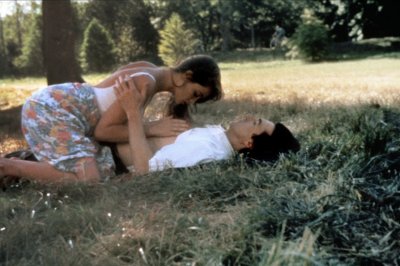Reviews - L'enfer
L'enfer
Reviewed By John Stakes

L'enfer
The combined talents of two of the most renowned directors in the history of French cinema were instrumental in the making of this 1994 thriller on the subject of jealousy. Henri-Georges Clouzot (The Wages of Fear, Les Diaboliques) had been working on his own version of the film since 1964 when ill-health overtook him. In 1992 his astute widow sold the script to Claude Chabrol (Le Boucher) who completed the picture in 1994. The Chabrol version was screened last Saturday, and a documentary made in 2008 by Serge Bromberg, which included a reconstruction of Clouzot’s own film footage (thanks to his widow now selling her husband’s unfinished screen material), was shown on Sunday. Comparison was inevitable but this reviewer is not in a position to make it as he was unable to attend Sunday’s screening.
Chabrol is often described as the French Hitchcock. Both were fascinated by the destructive quality of obsession, jealousy and passion, and both were master craftsmen in the technique of drawing their audiences into the developing drama which usually climaxed in death.
L’Enfer stars Emmanuelle Béart as Nelly and François Cluzet as Paul, both young and recently married hoteliers on a large idyllic country estate. Their early married life up to when their son Julien first attends school was whisked through presumably because it was dramatically uneventful. They seem happily married, but a number of seemingly trivial incidents (a lost keepsake, a lingering smile and some missing hours) soon ignite Paul’s suspicions as to his wife’s fidelity.
From this point onwards it’s downhill all the way for Paul whose jealousy becomes obsessive and possessive. Nelly’s reassurances of fidelity fall on his deaf ears. Nelly is impossibly beautiful. The local garage proprietor Martineau is extraordinarily handsome so it is no surprise that Nelly’s casual dalliances with him quickly sow the seeds of doubt in Paul’s mind. Her sexuality is all too evident matched by an inability to control it so the now far from happy couple become locked in a downward spiral laden with, in theatrical terms, a tragic inevitability.
Paul’s psychological disintegration sees him restricting Nelly’s freedom of movement until finally he locks her in the bedroom and ties her to the bed where, in a deliberately ambiguous dénouement, we know not for certain whether he has killed her. In his deranged state Paul imagines his torment will never end but probably because he’s unable to recognise that he’s killed Nelly either from a sleeping tablet overdose or by nastier means.
There was much to admire in Chabrol’s style. As Paul quickly loses his sanity so the hotel changes from a laughter and happiness-filled venue to an eerily-lit soulless building with darkened recesses. Chabrol’s camera often lured us into rooms and manipulated our attention in true Hitchcockian manner. The point from which Paul lost his grip on reality was cleverly blurred making us unsure whether we were witnessing real events or creations of Paul’s imagination. Was the bizarre scene in the doctor’s surgery reality or fiction?
The portrayal of mental impairment is never an easy task and in the main Cluzet handled his descent into madness with conviction though at times his face seemed overly contorted and there was much eye-rolling. We were assisted by occasional voice-overs from his character in which he articulated his tortured thoughts. Everyone around Paul seemed to have a real zest for life and enjoyed each other’s company which served to heighten his self-alienation and the burden of his jealousy.
Béart expertly displayed Nelly’s full range of emotions from spoilt, pouty, school- girly manner, through coquettish luscious-lipped tease and loving wife to victim of mental and physical abuse. She deftly handled the ambiguity of her behaviour and her inability to avoid suspicion.
Whilst L’Enfer contained many acknowledgements of the genius of Hitchcock, some scenes lacked the master’s rigorous quality of construction and timing. The first half felt overly frenetic as we were pitch-forked in and out of scenes and only in the later scenes were tension and drama allowed to develop and with that both our empathy and sympathy.
And here’s a postscript to the L’Enfer saga. Research reveals yet another L’Enfer and starring Emmanuelle Béart again! It was made in 2005 by Danis Tanovic from a script by “Three Colours” Polish director Kryzstof Kieslowski. This time Béart as the wife is on the receiving end as it’s her husband who is having an affair which she knows about. Just deserts some might say!
Chabrol is often described as the French Hitchcock. Both were fascinated by the destructive quality of obsession, jealousy and passion, and both were master craftsmen in the technique of drawing their audiences into the developing drama which usually climaxed in death.
L’Enfer stars Emmanuelle Béart as Nelly and François Cluzet as Paul, both young and recently married hoteliers on a large idyllic country estate. Their early married life up to when their son Julien first attends school was whisked through presumably because it was dramatically uneventful. They seem happily married, but a number of seemingly trivial incidents (a lost keepsake, a lingering smile and some missing hours) soon ignite Paul’s suspicions as to his wife’s fidelity.
From this point onwards it’s downhill all the way for Paul whose jealousy becomes obsessive and possessive. Nelly’s reassurances of fidelity fall on his deaf ears. Nelly is impossibly beautiful. The local garage proprietor Martineau is extraordinarily handsome so it is no surprise that Nelly’s casual dalliances with him quickly sow the seeds of doubt in Paul’s mind. Her sexuality is all too evident matched by an inability to control it so the now far from happy couple become locked in a downward spiral laden with, in theatrical terms, a tragic inevitability.
Paul’s psychological disintegration sees him restricting Nelly’s freedom of movement until finally he locks her in the bedroom and ties her to the bed where, in a deliberately ambiguous dénouement, we know not for certain whether he has killed her. In his deranged state Paul imagines his torment will never end but probably because he’s unable to recognise that he’s killed Nelly either from a sleeping tablet overdose or by nastier means.
There was much to admire in Chabrol’s style. As Paul quickly loses his sanity so the hotel changes from a laughter and happiness-filled venue to an eerily-lit soulless building with darkened recesses. Chabrol’s camera often lured us into rooms and manipulated our attention in true Hitchcockian manner. The point from which Paul lost his grip on reality was cleverly blurred making us unsure whether we were witnessing real events or creations of Paul’s imagination. Was the bizarre scene in the doctor’s surgery reality or fiction?
The portrayal of mental impairment is never an easy task and in the main Cluzet handled his descent into madness with conviction though at times his face seemed overly contorted and there was much eye-rolling. We were assisted by occasional voice-overs from his character in which he articulated his tortured thoughts. Everyone around Paul seemed to have a real zest for life and enjoyed each other’s company which served to heighten his self-alienation and the burden of his jealousy.
Béart expertly displayed Nelly’s full range of emotions from spoilt, pouty, school- girly manner, through coquettish luscious-lipped tease and loving wife to victim of mental and physical abuse. She deftly handled the ambiguity of her behaviour and her inability to avoid suspicion.
Whilst L’Enfer contained many acknowledgements of the genius of Hitchcock, some scenes lacked the master’s rigorous quality of construction and timing. The first half felt overly frenetic as we were pitch-forked in and out of scenes and only in the later scenes were tension and drama allowed to develop and with that both our empathy and sympathy.
And here’s a postscript to the L’Enfer saga. Research reveals yet another L’Enfer and starring Emmanuelle Béart again! It was made in 2005 by Danis Tanovic from a script by “Three Colours” Polish director Kryzstof Kieslowski. This time Béart as the wife is on the receiving end as it’s her husband who is having an affair which she knows about. Just deserts some might say!
Find A Film
Search over 1500 films in the Keswick Film Club archive.
Friends
KFC is friends with Caldbeck Area Film Society and Brampton Film Club and members share benefits across all organisations
Awards
Keswick Film Club won the Best New Film Society at the British Federation Of Film Societies awards in 2000.
Since then, the club has won Film Society Of The Year and awards for Best Programme four times and Best Website twice.
We have also received numerous Distinctions and Commendations in categories including marketing, programming and website.
 Talking Pictures
The KFC Newsletter
Talking Pictures
The KFC Newsletter
Links Explore the internet with Keswick Film Club


